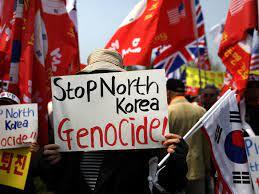This article was originally posted on UCANEWS.
Eight years after a no-holds-barred UN report, little has been done to hold a brutal regime to account…
Exactly eight years ago to the day yesterday, a United Nations body did something quite rare: it told the full, comprehensive, unambiguous, undiplomatic, cold, hard truth about one of the most brutal, repressive, bloody and ruthless regimes in the world, and it outlined a plan of action. No fudge, no obfuscation, no compromise — just the facts, an analysis of what they meant, and a set of recommendations for what to do.
The UN Commission of Inquiry on North Korea and its report, published on Feb. 17, 2014, should always be remembered as the gold standard for international investigation, the UN doing what it is meant to do but so often fails to do — the UN at its best.
But the report should not simply go down in history as a great report. It should not sit on bookshelves gathering dust or being perused by students of international relations or humanitarian and human rights law as an academic text.
Distinguished Australian judge Michael Kirby, who chaired the inquiry, and his colleagues — the former Indonesian attorney-general and UN special rapporteur on human rights in North Korea, Marzuki Darusman, and Serbian human rights expert Sonja Biserko — did not devote an entire year of their lives, hearing hours and hours of harrowing testimony, interrogating dozens of experts and escapees, reading through piles of witness evidence, only to have Feb. 17 marked each year as a memorial to their report by a handful of activists like me.
They devoted their time and considerable expertise to painstakingly gathering the most comprehensive dossier of evidence there has yet been about the North Korean regime’s terrible atrocities against its own people, with the purpose of motivating the international community to respond. Their efforts — and, even more importantly, the suffering and courage of the brave North Koreans who shared their stories in the inquiry’s public hearings — deserve a response and demand global action.
To take a step back for a moment, let me reflect on what led to the establishment of the Commission of Inquiry in the first place, and then its conclusions.
“It documented a catalogue of atrocities including extermination, murder, enslavement, torture, imprisonment, rape, forced abortions, severe religious persecution, enforced disappearances and starvation“
n 2007, the human rights organization with which I have been involved in various capacities for almost thirty years, CSW, published a groundbreaking report, North Korea: A Case to Answer, A Call to Act. Among other recommendations, that report called for the establishment of a UN Commission of Inquiry. It was one of the very first to do so. Indeed, I remember people telling me that we were wasting our time, banging our heads against a brick wall, as the UN would never, ever do this. I took the view that, on the contrary, if enough of us banged our heads against a brick wall for long enough, we might manage to dislodge some bricks.
For several years, we advocated for this goal, often as a voice crying in the wilderness. Around 2010, I became aware of a few other human rights organizations starting to float the same idea, and before long one of the world’s three largest and most influential groups, Human Rights Watch, was making this recommendation. It became clear to me that disparate, uncoordinated, ad hoc efforts were not going to achieve anything, but that a coordinated, worldwide coalition might stand a chance of making a difference.
To read more, please click here.
Benedict Rogers is a writer, human rights activist and senior analyst for East Asia at the international human rights organization CSW. He is also co-founder and deputy chair of the Conservative Party Human Rights Commission and co-founder of the International Coalition to Stop Crimes Against Humanity in North Korea (ICNK). He visited North Korea in 2010 with Lord Alton of Liverpool and Baroness Cox of Queensbury. The views expressed in this article are those of the author and do not necessarily reflect the official editorial position of UCA News.


